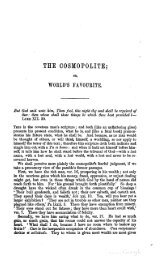- Page 5 and 6:
THECUZtlSTZAM'S CABXNST ZiZBILAItY,
- Page 8 and 9:
:ADDRESS.tion of such books of an e
- Page 11 and 12:
INTRODUCTION.The following definiti
- Page 13:
INTRODUCTION.vjections brought to s
- Page 16 and 17:
viiiINTRODUCTION.writer that ever a
- Page 18 and 19:
XINTRODUCTION.of the island, the lo
- Page 20 and 21:
:xiiINTRODUCTION.are mere impressio
- Page 22 and 23:
xivINTRODUCTION.addicted to the inv
- Page 25 and 26:
INTRODUCTION.xviiinterest which min
- Page 27 and 28:
INTRODUCTION.xixof their own hearts
- Page 29 and 30:
INTRODUCTION,xxiyou will find every
- Page 31:
INTRODUCTION.xxiiibut this follows
- Page 34 and 35:
xxviMEMOIR OF THEgreat inquisitiven
- Page 36 and 37:
xxviiiMEMOIR OF THEyears old, when
- Page 38 and 39:
XXXMEMOIR OF THEespecially by the B
- Page 40 and 41:
xxxiiMEMOIR OF THEdered by them des
- Page 42 and 43:
xxxivMEMOIR OF THEconsidered as the
- Page 44 and 45:
xxxviMEMOIR OF THEdays for humiliat
- Page 46 and 47:
xxxviiiMEMOIR OF THEand his habitat
- Page 48 and 49:
xlMEMOIR OF THE REV. ROBERT BOLTON.
- Page 50 and 51:
xliiCONTENTS.PageChap. III. Five ot
- Page 52 and 53:
.xlivCONTENTS.PageChap. III. The se
- Page 54 and 55:
—^2INSTRUCTIONS FOR COMFORTINGsup
- Page 56 and 57:
4 INSTRUCTIONS FOR COMFORTINGnego ;
- Page 58 and 59:
overINSTRUCTIONS FOR COMFORTINGall
- Page 60 and 61:
8 INSTRUCTIONS FOR COMFORTINGand et
- Page 62 and 63:
10 INSTRUCTIONS FOR COMFORTINGgiste
- Page 64 and 65:
12 INSTRUCTIONS FOR COMFORTINGam pe
- Page 66 and 67:
—14 INSTRUCTIONS FOR COMFORTINGCH
- Page 68 and 69:
16 INSTRUCTIONS FOR COMFORTINGpersu
- Page 70 and 71:
18 INSTRUCTIONS FOR COMFORTINGthat
- Page 72 and 73:
20 INSTRUCTIONS FOll COMFORTINGalso
- Page 74 and 75:
22 INSTRUCTIONS FOR COMFORTINGall.
- Page 76 and 77:
!;24 INSTRUCTIONS FOR COMFORTINGwhe
- Page 78 and 79:
26 INSTRUCTIONS FOR COMFORTINGheat
- Page 80 and 81:
28 INSTRUCTIONS FOR COMFORTINGments
- Page 82 and 83:
30 INSTRUCTIONS FOR COMFORTINGCHAP.
- Page 84 and 85:
32 INSTRUCTIONS FOR COMFORTINGgood-
- Page 86 and 87:
;34 INSTRUCTIONS FOR COMFORTINGwher
- Page 88 and 89:
:36 INSTRUCTIOT^fS FOR COMFORTINGth
- Page 90 and 91:
38 INSTRUCTIONS FOR COMFORTINGcount
- Page 92 and 93:
40 INSTRUCTIONS FOR COMFORTINGders,
- Page 96 and 97:
44 INSTRUCTIONS FOR COMFORTINGthat
- Page 98 and 99:
46 INSTRUCTIONS FOR COMFORTINGbefor
- Page 100 and 101:
—;48 INSTRUCTIONS FOR COMFORTINGk
- Page 102 and 103:
!50 INSTRUCTIONS FOR COMFORTINGhear
- Page 104 and 105:
:52 INSTRUCTIONS FOR COMFORTINGhall
- Page 106 and 107:
:54 INSTRUCTIONS FOR COMFORTINGboth
- Page 108 and 109:
56 INSTRUCTIONS TO 11 COMFORTINGgea
- Page 110 and 111:
"58 Ix^JSTRUCJ'IONS FOR COMFORTINGs
- Page 112 and 113:
Yea,and;60 INSTRUCTIONS FOR COMFORT
- Page 114 and 115:
62 INSTRUCTIONS FOR COMFORTINGat la
- Page 116 and 117:
64 INSTRUCTIONS FOR COMFORTINGwhole
- Page 118 and 119:
66 INSTRUCTIONS FOR COMFORTINGplot
- Page 120 and 121:
68 INSTRUCTIONS FOLl COMFORTINGthan
- Page 122 and 123:
70 INSTRUCTIONS FOR COMFORTINGjudgm
- Page 124 and 125:
72 INSTRUCTIONS FOR COMFORTINGfurio
- Page 126 and 127:
74 INSTRUCTIONS FOR COMFORTINGa tim
- Page 128 and 129:
I he;78 INSTRUCTIONS FOR COMFORTING
- Page 130 and 131:
;78 INSTRUCTIONS FOR COMFORTINGYet
- Page 132 and 133:
80 INSTRUCTIONS FOR COMFORTINGsecon
- Page 134 and 135:
!the;82 INSTRUCTIONS FOR COMFORTING
- Page 136 and 137:
84 INSTRUCTIONS FOR COMFORTINGvanit
- Page 138 and 139:
asINSTRUCTIONS FOR COMFORTINGhave b
- Page 140 and 141:
88 INSTRLCTIOiNS FOR COMFORTINGvour
- Page 142 and 143:
90 INSTRUCTIONS FOR COMFORTINGwoude
- Page 144 and 145:
SECT. IL PART I.CHAP. I.Tlie first
- Page 146 and 147:
94 INSTRUCTIONS FOR COMFORTINGhim i
- Page 148 and 149:
96 INSTRUCTIONS FOR COxMFORTINGof a
- Page 150 and 151:
98 INSTRUCTIONS FOR COMFORTINGsever
- Page 152 and 153:
100 INSTRUCTIONS FOR COMFORTINGObj.
- Page 154 and 155:
—102 INSTKUCTIONS FOR COMFORTING"
- Page 156 and 157:
104 INSTRUCTIONS FOR COMFORTINGI in
- Page 158 and 159:
;106 INSTRUCTIONS FOR COMFORTINGand
- Page 160 and 161:
—108 INSTRUCTIONS FOR COMFORTINGt
- Page 162 and 163:
!—noINSTRUCTIONS FOR COMFORTINGac
- Page 164 and 165:
11-2 INSTRUCTIONS FOR COMFORTINGove
- Page 166 and 167:
114 INSTRUCTIONS FOR COMFORTINGNow,
- Page 168 and 169:
;116 INSTRUCTIONS FOR COMFORTINGSpi
- Page 170 and 171:
118 INSTRUCTIONS FOR COMFORTINGvine
- Page 172 and 173:
—120 INSTRUCTIONS FOR COMFORTINGt
- Page 174 and 175:
122 INSTRUCTIONS FOR COMFORTINGof h
- Page 176 and 177:
124 INSTRUCTIONS FOR COMFORTINGpres
- Page 178 and 179:
yet126 INSTRUCTIONS FOR COMFORTINGN
- Page 180 and 181:
12BINSTRUCTIONS FOR COxMFORTINGsome
- Page 182 and 183:
;130 INSTRUCTIONS FOR COMFORTINGf^h
- Page 184 and 185:
132 INSTRUCTIONS FOR COMFORTINGwast
- Page 186 and 187:
;134 INSTRUCTIONS FOR COMFORTINGlou
- Page 188 and 189:
)136 INSTRUCTIONS FOR COMFORTINGque
- Page 190 and 191:
138 INSTRUCTIONS FOR COMFORTINGbody
- Page 192 and 193:
140 INSTRUCTIONS FOR COMFOI.TINGJer
- Page 194 and 195:
'and:14-2 INSTRUCTIONS FOR COMFORTI
- Page 196 and 197:
144 INSTRUCTIONS FOR COMFORTING(tho
- Page 198 and 199:
146 INSTRUCTIONS FOR COMFORTINGtish
- Page 200 and 201:
148 INSTRUCTIONS FOR COMFORTINGand
- Page 202 and 203:
—;150 INSTRUCTIONS FOR COMFORTING
- Page 204 and 205:
152 INSTRUCTIONS FOR COMFORTINGI co
- Page 206 and 207:
;154 INSTRUCTIONS FOR COMFORTINGthe
- Page 208 and 209:
From;156 INSTRUCTIONS FOR COMFORTIN
- Page 210 and 211:
158 INSTRUCTIONS FOR COMFORTINGhe w
- Page 212 and 213:
160 INSTRUCTIONS FOR COMFORTINGthe
- Page 214 and 215:
162 INSTRUCTIOxNTS FOR COMFORTINGno
- Page 216 and 217:
164 INSTRUCTIONS FOR COMFORTINGflat
- Page 218 and 219:
—;166 INSTllUCTIONS FOR COMFORTIN
- Page 220 and 221:
168 INSTRUCTIONS FOR COMFORTINGagai
- Page 222 and 223:
170 INSTRUCTIONS FOR COMFORTINGrise
- Page 224 and 225:
172 INSTRUCTIONS FOR COMFORTINGa ti
- Page 226 and 227:
174 INSTRUCTIONS FOR COMFORTINGcase
- Page 228 and 229:
176 INSTRUCTIONS FOR COMFORTINGravi
- Page 230 and 231:
170 INSTRUCTIONS FOR COMFORTINGwill
- Page 232 and 233:
180 INSTRUCTIONS FOR COMFORTING^hea
- Page 234 and 235:
182 INSTRUCTIONS FOR COMFORTINGout
- Page 236 and 237:
184 INSTRUCTIONS FOR COMFORTINGGod,
- Page 238 and 239:
:laeINSTRUCTIONS FOR COMFORTINGfor
- Page 240 and 241:
—;188 INSTRUCTIONS FOR COMFORTING
- Page 242 and 243:
190 INSTRUCTIONS FOR COMFORTINGansw
- Page 244 and 245:
—192 INSTRUCTIONS FOR COMFORTINGi
- Page 246 and 247:
194 INSTRUCTIONS FOR COMFORTINGview
- Page 248 and 249:
—196 INSTRUCTIONS FOR COMFORTINGC
- Page 250 and 251:
198 INSTRUCTIONS FOR COMFORTINGOthe
- Page 252 and 253:
200 INSTRUCTIONS FOR COMFORTINGand
- Page 254 and 255:
202 INSTRUCTIOxXS FOR COMFORTINGCHA
- Page 256 and 257:
204 INSTRUCTIONS FOR COMFORTINGthe
- Page 258 and 259:
206 INSTRUCTIONS FOR COMFORTINGzeal
- Page 260 and 261:
208 INSTRUCTIONS FOR COMFORTINGcons
- Page 262 and 263:
—;210 INSTRUCTIONS FOR COMFORTING
- Page 264 and 265:
;212 INSTRUCTIONS FOR COMFORTINGwea
- Page 266 and 267:
214 INSTRUCTIONS FOR COMFORTINGout
- Page 268 and 269:
216 INSTRUCTIONS FOR COMFORTINGman'
- Page 270 and 271: 218 INSTRUCTIONS FOR COMFORTINGwhic
- Page 272 and 273: 220 INSTRUCTIONS FOR COMFORTINGof t
- Page 274 and 275: 222 INSTRUCTIONS FOR COMFORTINGsion
- Page 276 and 277: nay,224 INSTRUCTIONS FOR COMFORTING
- Page 278 and 279: 226 INSTRUCTIONS FOR COMFORTINGCHAP
- Page 280 and 281: "228 INSTRUCTIONS FOR COMFORTINGor
- Page 282 and 283: SECT. Ill, PART I.CHAP. T.Three Pri
- Page 284 and 285: 232 INSTRUCTIONS FOR COMFORTINGtrea
- Page 286 and 287: 234 INSTRUCTIONS FOR COMFORTINGa. p
- Page 288 and 289: Oh236 INSTRUCTIONS FOR COMFORTINGan
- Page 290 and 291: 238 INSTRUCTIONS FOR COMFORTINGstre
- Page 292 and 293: 240 INSTRUCTIONS FOR COMFORTINGfor
- Page 294 and 295: 242 INSTRUCTIONS FOR COMFORTINGand
- Page 296 and 297: •244 INSTRUCTIONS FOR COMFORTINGu
- Page 298 and 299: 246 INSTRUCTIONS FOR COMFORTINGhim,
- Page 300 and 301: 248 INSTRUCTIONS FOR COMFORTINGever
- Page 302 and 303: 250 INSTRUCTIONS FOR COMFORTINGwolv
- Page 304 and 305: 252 INSTRUCTIONS FOR COMFORTINGFath
- Page 306 and 307: ut254 INSTRUCTIONS FOR COMFORTING6.
- Page 308 and 309: 256 INSTRUCTIONS FOR COMFORTINGself
- Page 310 and 311: 253 INSTRUCTIONS FOR COMFORTINGthou
- Page 312 and 313: IIDvkCjOf260 INSTRUCTIONS FOR COMFO
- Page 314 and 315: 262 INSTRUCTIONS FOR COMFORTINGin p
- Page 316 and 317: 264 INSTRUCTIONS FOR COMFORTINGand
- Page 318 and 319: my266 INSTRUCTIONS FOR COMFORTINGof
- Page 322 and 323: 270 INSTRUCTIONS FOR COMFORTING" Wh
- Page 324 and 325: 272 INSTRUCTIONS FOR COMFORTINGfrom
- Page 326 and 327: 274 INSTRUCTIONS FOR COMFORTING3. S
- Page 328 and 329: "276 INSTRUCTIONS FOR COMFORTINGsuc
- Page 330 and 331: 278 INSTRUCTIONS FOR COMFORTINGis h
- Page 332 and 333: 280 INSTRUCTIONS FOR COMFORTINGproa
- Page 334 and 335: ^282INSTRUCTIONS FOR COMFORTINGcom-
- Page 336 and 337: ;;284 INSTRUCTIONS FOR COMFORTINGis
- Page 338 and 339: —"286 INSTRUCTIONS FOR COMFORTING
- Page 340 and 341: 288 INSTRUCTIONS FOR COMFORTINGment
- Page 342 and 343: How290 INSTRUCTIONS FOR COMFORTINGa
- Page 344 and 345: ;292 INSTRUCTIONS FOR COMFORTINGus"
- Page 346 and 347: 291 INSTRUCTIONS FOR COMFORTINGuniv
- Page 348 and 349: what296 INSTRUCTIONS FOR COMFORTING
- Page 350 and 351: 298 INSTRUCTIONS FOR COMFORTING[4.]
- Page 352 and 353: ;300 INSTRUCTIONS FOR COMFORTINGsou
- Page 354 and 355: 302 INSTRUCTIONS FOR COMFORTINGnot
- Page 356 and 357: 304 INSTRUCTIONS FOR COMFORTINGyet
- Page 358 and 359: 306 INSTRUCTIONS FOR COMFORTINGthem
- Page 360 and 361: 308 INSTRUCTIONS FOR COMFORtI^TG'ne
- Page 362 and 363: 310 INSTRUCTIONS FOR COMFORTING6),
- Page 364 and 365: •of312 INSTRUCTIONS FOR COMFORTIN
- Page 366 and 367: —314 INSTRUCTIONS FOR COMFORTINGb
- Page 368 and 369: 316 INSTRUCTIONS FOR COMFORTINGhein
- Page 370 and 371:
318 INSTRUCTIONS FOR COMFORTINGsecu
- Page 372 and 373:
320 INSTRUCTIONS FOR COMFORTINGwere
- Page 374 and 375:
322 INSTRUCTIONS FOR COMFORTINGtrem
- Page 376 and 377:
—324 INSTRUCTIONS FOR COMFORTINGd
- Page 378 and 379:
'326 INSTRUCTIONS FOR COMFORTINGthe
- Page 380 and 381:
328 INSTRUCTIONS FOR COMFORTINGand
- Page 382 and 383:
330 INSTRUCTIONS FOR COMFORTINGwalk
- Page 384 and 385:
:332 INSTRUCTIONS FOR COMFORTINGJ^a
- Page 386 and 387:
334 INSTRUCTIONS FOR COMFORTINGlife
- Page 388 and 389:
n36INSTRUCTIONS FOR COMFORTINGenjoy
- Page 390 and 391:
338 INSTRUCTIONS FOR COMFORTINGaffa
- Page 392 and 393:
340 INSTRUCTIONS FOR COMFORTINGand
- Page 394 and 395:
342 INSTRUCTIONS FOR COMFORTINGtion
- Page 396 and 397:
344 INSTia;CTIONS FOR COMFORTINGdea
- Page 398 and 399:
346 INSTRUCTIONS FOR COMFORTINGown
- Page 400 and 401:
348 INSTRUCTIONS FOR COMFORTINGvict
- Page 402 and 403:
350 INSTRUCTIONS FOR COiMFORTINGexp
- Page 404 and 405:
—352 INSTRUCTIONS FOR COMFORTINGt
- Page 406 and 407:
354 INSTRUCTIONS FOR COMFORTINGwith
- Page 408 and 409:
356 INSTRUCTIONS FOR COMFORTINGmove
- Page 410 and 411:
358 INSTRUCTIONS FOR COMFORTING2. L
- Page 412 and 413:
How360 INSTRUCTIONS FOR COMFORTINGa
- Page 414 and 415:
362 INSTRUCTIONS FOR COMFORTINGCHAP
- Page 416 and 417:
364 INSTRUCTIONS FOR COMFORTINGhis
- Page 418 and 419:
:366 INSTRUCTIONS FOR COMFORTINGbea
- Page 420 and 421:
368 INSTRUCTIONS FOR COMFORTINGing
- Page 422 and 423:
:370 INSTRUCTIONS FOR COMFORTINGthe
- Page 424 and 425:
372 INSTRUCTIONS FOR COMFORTINGfoul
- Page 426 and 427:
374 INSTRUCTIONS FOR COMFORTINGby d
- Page 428 and 429:
376 INSTRUCTIONS FOR COMFORTINGclea
- Page 430 and 431:
378 INSTRUCTIONS FOR COMFORTINGprot
- Page 432 and 433:
380 INSTRUCTIONS FOR COMFORTINGsing
- Page 434 and 435:
!;382 INSTRUCTIONS FOR COMFORTINGaw
- Page 436 and 437:
!384 INSTRUCTIONS FOR COMFORTINGrel
- Page 438 and 439:
386 INSTRUCTIONS FOR COMFORTINGpard
- Page 440 and 441:
388 INSTRUCTIONS FOR COMFORTINGsuch
- Page 442:
390 AFFLICTED CONSCIENCES.from thy







